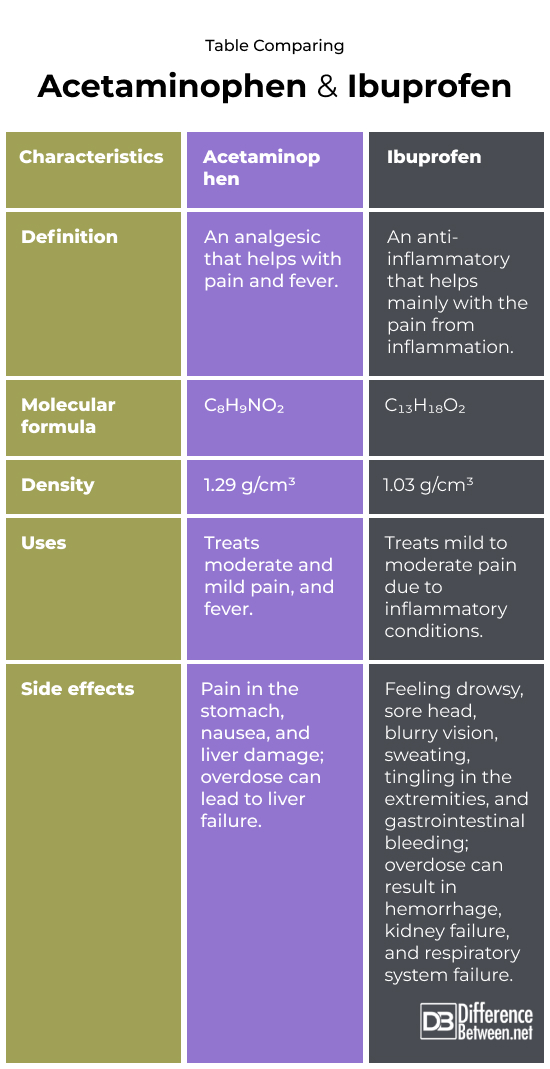Difference Between Acetaminophen and Ibuprofen
Acetaminophen is a non-opioid medicine that people can get over-the-counter (OTC) and use to help treat their pain. It also helps reduce high fevers and is one of the most commonly used medications to treat painful conditions. Acetaminophen is the active ingredient in Tylenol and Panadol. Ibuprofen is also a painkiller and, similar to acetaminophen, is not an opioid. It is, however, a medicine commonly used to treat pain and inflammation. Ibuprofen is the active ingredient in Advil and Brufen. Ibuprofen is in the class of non-steroidal anti-inflammatory medications.
In short, you can use both acetaminophen and ibuprofen to ease the discomfort of painful conditions, and they can be taken together. However, you should check with your doctor if you are in pain, and before trying any new medication. Dosage is critical, as both medications have side effects and can be dangerous if you take too much.

What is Acetaminophen?
Definition:
Acetaminophen, also known as para-hydroxyacetanilide, is a medicine that can be taken to help with pain and to decrease fever. It can be used for short-term and chronic painful conditions. Acetaminophen works by acting on receptors in both the spinal cord and brain, to help block the pathways involved in sensing pain.
Uses:
Acetaminophen is primarily used to treat mild pain and pain that is moderate but not severe. It is commonly used to help decrease fever in ill individuals. People take acetaminophen for headaches, toothaches, and muscle aches. It can help to alleviate some of the discomfort and fever associated with illnesses like the flu. It is not often effective for treating migraines unless combined with other ingredients. You can ask your pharmacist and doctor what they recommend for migraines.
Side effects:
There are many side effects to taking acetaminophen, including constipation, nausea, and diarrhea. The most dangerous side effect is due to its hepatotoxicity. In other words, acetaminophen can be very toxic to the liver, and the person may become jaundiced, experience stomach pain, vomiting, and have itchy skin. Liver damage is more common if you overdose on the medicine, so you need to be very careful not to take too much acetaminophen.

What is Ibuprofen?
Definition:
Ibuprofen, also known as 2-(4-iso-butylphenyl)propionic acid, is an anti-inflammatory that is non-steroidal. It is classed as an NSAID, and is a common medicine that is available OTC. This medicine can help with many different kinds of inflammatory disorders. Ibuprofen works by blocking the way the body makes inflammatory molecules called prostaglandins. These molecules trigger the inflammation that can cause you to feel sore and uncomfortable.
Uses:
People with inflammatory disorders like osteoarthritis, rheumatoid arthritis, and dysmenorrhea often take ibuprofen to reduce the inflammation, which is responsible for their discomfort. It can also be taken to treat problems like muscle sprains and the aching associated with viral infections like the flu. Migraine sufferers can sometimes be helped if they use ibuprofen. This medicine is also quite helpful for patients who are suffering pain after surgery, meaning less of the strong opioid painkillers may be needed.
Side effects:
There are many possible side effects associated with taking ibuprofen. Side effects include drowsiness, blurred vision, and headache. More serious side effects include gastrointestinal bleeding; overdose of ibuprofen can result in hemorrhage, kidney failure, and, even respiratory failure. GI bleeding commonly results from the use of NSAIDS, so you should consult your doctor if you have a stomach problem before using ibuprofen or any other NSAID.
Difference between Acetaminophen and Ibuprofen?
Definition
Acetaminophen is an analgesic used to treat fever and pain. Ibuprofen is an anti-inflammatory medicine that treats inflammation and pain.
Molecular formula
The molecular formula for acetaminophen is C8H9NO2. The molecular formula for ibuprofen is C13H18O2.
Density
The density of acetaminophen is 1.29 g/cm³, while the density for ibuprofen is 1.03 g/cm³.
Uses
Acetaminophen is used to treat mild and moderate pain and fever. Ibuprofen treats inflammation and pain.
Side effects
Side effects of acetaminophen use include: pain in the stomach, nausea, and liver damage; overdose can result in liver failure. Side effects of ibuprofen use include: drowsiness, sore head, blurred vision, sweating, tingling in the extremities, and gastrointestinal bleeding; overdose can result in hemorrhage, and failure of the kidneys and respiratory system.
Table comparing Acetaminophen and Ibuprofen

Summary of Acetaminophen Vs. Ibuprofen
- Acetaminophen and ibuprofen are common OTC painkiller medications.
- Acetaminophen works on pain in the brain and is good for reducing fever.
- Ibuprofen works throughout the body to reduce inflammation and its associated pain.
FAQ
Which is better acetaminophen or ibuprofen?
It depends on the cause of the pain. For inflammation, ibuprofen is best, but if you have a history of stomach bleeding, then acetaminophen may be preferred.
Why do hospitals use Tylenol instead of ibuprofen?
Doctors consider Tylenol to be a safer option for patients.
Can I take acetaminophen and ibuprofen together?
Yes, you can take both these medicines together.
Is Tylenol and acetaminophen the same thing?
Yes, Tylenol is the brand name for the medicine that contains acetaminophen.
Why do doctors recommend ibuprofen over Tylenol?
Doctors recommend ibuprofen over Tylenol if the person has discomfort from inflammation.
Who should not take ibuprofen?
Anyone with heart, liver, or kidney failure should avoid ibuprofen.
Is it harmful to take 2 ibuprofen every day?
You should avoid taking ibuprofen for more than a month because it can cause stomach bleeding.
Which is worse for your liver acetaminophen or ibuprofen?
Acetaminophen is worse for your liver than ibuprofen.
Is ibuprofen more powerful than Tylenol?
Many consider ibuprofen to be more powerful because it has an anti-inflammatory reaction and works throughout the body.
- Difference Between Rumination and Regurgitation - June 13, 2024
- Difference Between Pyelectasis and Hydronephrosis - June 4, 2024
- Difference Between Cellulitis and Erysipelas - June 1, 2024
Search DifferenceBetween.net :
1 Comment
Trackbacks
Leave a Response
References :
[0]Ngo, Vincent Trung H., and Tushar Bajaj. "Ibuprofen." StatPearls, 2023, https://www.ncbi.nlm.nih.gov/books/NBK542299/
[1]Ohashi, Nobuko, and Tatsuro Kohno. "Analgesic effect of acetaminophen: a review of known and novel mechanisms of action." Frontiers in Pharmacology 11 (2020): 1916.
[2]Tanne, Janice. "Paracetamol causes most liver failure in UK and US." Bmj 332.7542 (2006): 628.
[3]Image credit: https://www.canva.com/photos/MADA8KDxb0c-acetaminophen-or-paracetamol-medicine/
[4]Image credit: https://www.canva.com/photos/MAEEytDUuP8-ibuprofen-medication/
